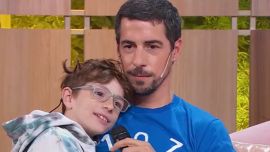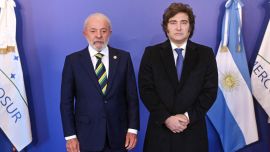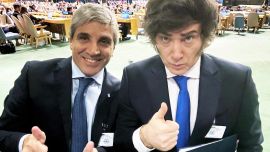Five years after the mysterious death of special prosecutor Alberto Nisman, just days after he accused then-president Cristina Fernández de Kirchner of a cover-up in the 1994 bombing of the AMIA Jewish community centre, a Netflix documentary has revived debate in the country still bitterly divided over the case.
The Prosecutor, the President and the Spy, a six-part docuseries by British filmmaker Justin Webster, examines the prosecutor's still unsolved death only days after he accused Fernández de Kirchner of colluding with Iran to allow the alleged authors of the bombing to go free.
Calls have gone out on social media for a demonstration Saturday in downtown Buenos Aires against the government of President Alberto Fernández – whose vice-president is Fernández de Kirchner – to mark the anniversary of his death.
Jewish organisations – angered that no-one has ever been convicted of the bombing – and Nisman's family will participate in a separate event at the prosecutor's grave.
The decision not to take part in the anti-government protest was announced after the government said Fernández would visit Israel and take part in an international forum to commemorate the 75th anniversary of the liberation of Auschwitz.
Argentina's 300,000-member Jewish community is the largest in Latin America.
Deadliest attack
The July 1994 bombing at the Argentine Jewish Mutual Association (AMIA), a Jewish community centre in the capital, remains the deadliest terror strike in the country's history: it killed 85 people and wounded 300.
After a botched investigation tainted by corruption allegations, Nisman was appointed to lead a new probe. In 2006, he accused Iran of ordering the attack via the Lebanese militant group Hezbollah.
But his efforts to prosecute five Iranian officials, including former president Akbar Hashemi Rafsanjani, were cut short when Fernández de Kirchner's administration signed a deal with Iran to set up a Tehran-based joint commission to investigate the attacks.
Nisman accused the then-president of sealing the deal in exchange for oil and trade benefits, basing his accusations on hundreds of hours of wiretaps. Fernández de Kirchner dismissed the allegations as part of a plot by disgruntled intelligence agents to discredit her.
Days later, on January 19, 2015 – and just before he was to present his findings to Congress – the prosecutor's body was found in the bathroom of his Puerto Madero apartment with a gunshot wound to the head, delivered at close range from a handgun found at his side.
An initial autopsy concluded Nisman was alone. However, a second forensic probe two years later by Argentina’s Gendarmerie (Border Guard) backed the murder theory supported by Nisman's family and the Argentine prosecutors' association.
'Makes me want to cry'
Alberto Fernández added fuel to the debate last week, saying he "had a hard time believing" it was suicide, though he acknowledged the lack of evidence for the murder theory.
Pablo Duggan, author of the book Who Killed Nisman? is emphatic.
"Nisman committed suicide. It's all proven in the file. This case should have been closed three years ago."
Predictably, the series – which highlights the role played in the AMIA investigation by the intelligence services and the CIA –has caused a storm of reaction on Twitter.
"Five minutes of the Nisman series and it makes me want to cry and leave the country forever," declared one user, Lu Abelera.
The documentary tips the scales towards suicide, however.
"Nobody changes their initial position after watching the documentary," said sociologist Artemio López. "People's views on the death are influenced by public sensitivities, their values and public discourse, depending on whether they are for or against the governments of Macri or Fernández."
Endless legal wrangles
Nisman's accusation was twice dismissed before investigating Federal Judge Claudio Bonadio took up the case in 2016, after Fernández de Kirchner had been replaced by Mauricio Macri as president.
Four of Nisman's bodyguards and his computer technician Diego Lagomarsino, owner of the gun that killed Nisman, were eventually charged. Lagomarsino argues that Nisman asked to borrow his weapon because he feared for the lives of his daughters.
That trial has yet to take place, but a former judge who led the first probe into the AMIA bombing was jailed last year for concealing and violating evidence, along with two former prosecutors and a former intelligence chief.
Fernández de Kirchner, president from 2007 to 2015, and her foreign minister Héctor Timerman, who died of cancer in 2019 while under house arrest in the AMIA case, insisted they were trying to resolve the case which had stalled for 20 years.
by Liliana Samuel, AFP



















Comments